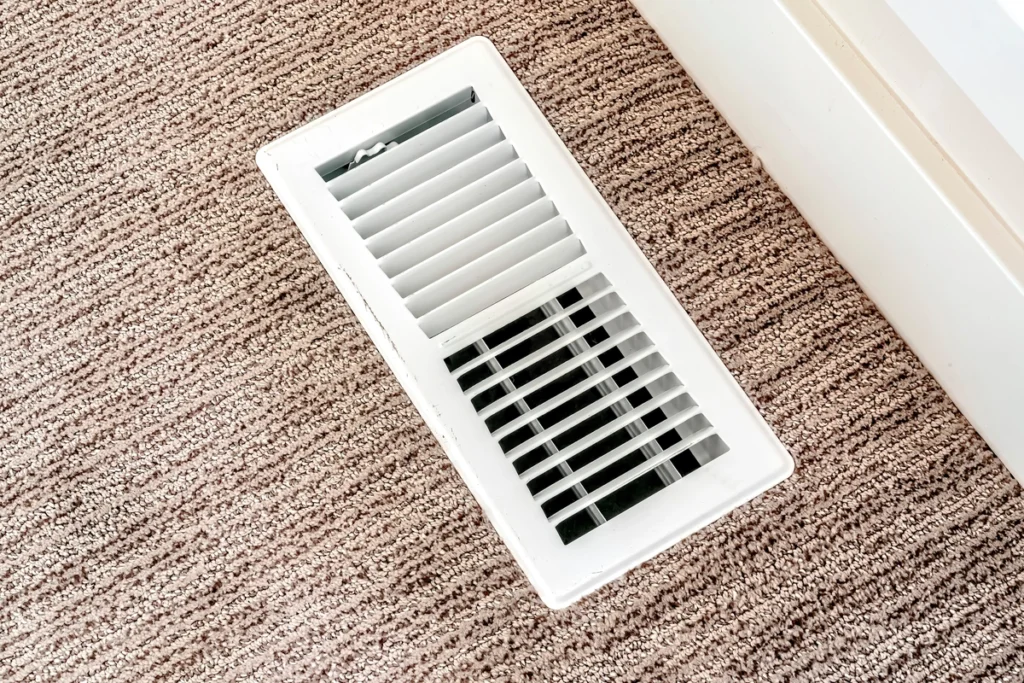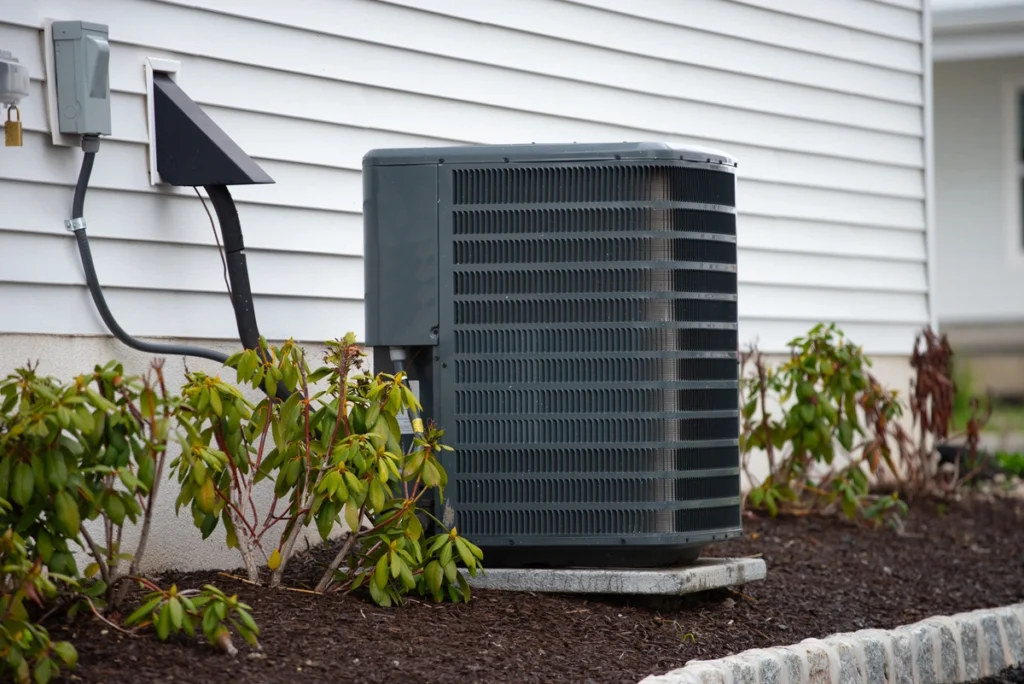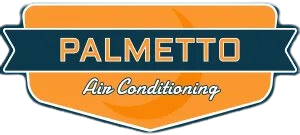When it comes to heating and cooling systems for your home, two popular options stand out: forced air and central air. Each system has its own set of features, benefits, and drawbacks, making the choice between them a crucial decision for homeowners.
Today, we’ll delve into the intricacies of forced air vs. central air systems, breaking down:
- Their pros and cons
- Factors to consider when choosing between them
- Installation costs
- Tips on maintenance to keep your system running smoothly
What is Forced Air?

Forced air heating and cooling systems use ducts to distribute air throughout your home. In these systems, air is heated or cooled at a central unit, typically a furnace or air handler, and then pushed through ductwork using a blower fan. This air is released into individual rooms through vents or registers, providing consistent temperature control throughout the house.
✅ Pros of Forced Air:
- Efficiency: Forced air systems can heat or cool a home quickly and efficiently, providing rapid temperature adjustments.
- Versatility: These systems can accommodate various fuel sources, including natural gas, propane, electricity, or even renewable energy options like solar power.
- Air Quality: Forced air systems can include filters to trap dust, pollen, and other airborne particles, improving indoor air quality.
- Zoning Capabilities: With the addition of zoning controls, forced air systems can regulate temperature independently in different areas of the house, enhancing comfort and energy efficiency.
❌ Cons of Forced Air:
- Air Distribution: Ducts can develop leaks or become obstructed, leading to uneven heating or cooling throughout the home.
- Noise: The operation of the blower fan can generate noise, which may be bothersome to some homeowners.
- Air Quality Concerns: If not properly maintained, forced air systems can circulate dust and allergens, potentially aggravating respiratory issues.
What is Central Air?

Central air conditioning systems are a type of forced air system specifically designed for cooling. Like forced air heating systems, central air conditioners use ducts to distribute cooled air throughout the home. They consist of an outdoor unit containing a compressor and condenser coil, connected to an indoor evaporator coil and air handler.
✅ Pros of Central Air:
- Whole-House Cooling: Central air systems can efficiently cool the entire home, maintaining consistent temperature levels across different rooms.
- Quiet Operation: Compared to individual window units, central air conditioners operate quietly, providing a more comfortable indoor environment.
- Increased Home Value: Installing central air conditioning can enhance the resale value of your home, as it is a desirable feature for many homebuyers.
- Energy Efficiency: Modern central air systems come with high-efficiency ratings, helping to lower energy bills and reduce environmental impact.
❌ Cons of Central Air:
- Initial Cost: The upfront cost of installing a central air system can be significant, especially if ductwork needs to be installed or upgraded.
- Dependency on Ductwork: Central air systems rely on ducts to distribute air, and any issues with ducts can affect performance and efficiency.
- Maintenance Requirements: Central air systems require regular maintenance, including filter replacement and coil cleaning, to ensure optimal performance and longevity.
Choosing the Right System for Your Home
When deciding between forced air and central air systems, several factors should be taken into consideration:
- Home Size and Layout: The size and layout of your home will influence the effectiveness of both forced air and central air systems. Larger homes may benefit from the zoned heating and cooling capabilities of forced air systems, while smaller homes may find central air conditioning more practical.
- Existing Infrastructure: If your home already has ductwork in place, installing a central air system may be more cost-effective. However, if ductwork is not present or needs significant upgrades, a forced air system may be a better option.
- Climate Considerations: Your local climate will play a role in determining which system is more suitable for your needs. Areas with extreme temperatures may require a more robust heating and cooling solution, which could favor a forced air system.
- Budget: Consider your budget not only for the initial installation but also for long-term maintenance and operational costs. While central air systems may have higher upfront costs, they can offer energy savings and increased home value over time.
Cost of Installation
The cost of installing a new heating and cooling system can vary depending on several factors, including the type of system chosen, the size of the home, and any necessary modifications to existing infrastructure. Here’s a breakdown of potential costs:
- Forced Air System: The cost of installing a forced air heating and cooling system typically ranges from $3,000 to $7,000 for a standard-sized home. This estimate includes the cost of the furnace or air handler, ductwork installation or modification, and labor fees.
- Central Air Conditioning: Installing a central air conditioning system can cost between $3,000 and $10,000, depending on factors such as the size of the home, the efficiency rating of the unit, and any ductwork modifications required.
- Additional Considerations: Keep in mind that additional costs may arise for optional features such as zoning controls, programmable thermostats, or air purification systems. It’s essential to discuss these options with your HVAC contractor to determine the best solution for your needs and budget.
Maintenance Tips for Heating and Cooling Systems
Regular maintenance is key to ensuring the efficiency, reliability, and longevity of your heating and cooling systems. Here are some essential maintenance tasks to keep your system running smoothly:
Replace Air Filters:
Dirty or clogged air filters can restrict airflow and reduce system efficiency. Check and replace filters regularly, typically every 1-3 months, or as recommended by the manufacturer.
Clean Air Ducts:
Periodically inspect and clean ductwork to remove dust, debris, and potential obstructions. Professional duct cleaning may be necessary every few years, especially if you notice reduced airflow or indoor air quality issues.
Schedule Professional Inspections:
Arrange for annual maintenance visits from a qualified HVAC technician to inspect and service your heating and cooling equipment. They can identify and address any potential issues before they escalate into costly repairs.
Check Thermostat Settings:
Ensure that your thermostat is programmed correctly and functioning properly. Consider upgrading to a programmable or smart thermostat for greater control over your home’s temperature settings and energy usage.
Monitor Outdoor Units:
Keep the outdoor condenser unit of your central air conditioner free from debris, such as leaves, grass clippings, or branches. Trim vegetation around the unit to maintain adequate airflow and prevent overheating.
By following these maintenance tips and investing in regular professional servicing, you can maximize the performance and lifespan of your heating and cooling systems, saving money on energy bills and avoiding unexpected breakdowns.
Get Professional Advice
Forced air and central air systems each offer unique advantages and considerations for homeowners seeking efficient and reliable heating and cooling solutions. Understanding the differences between these systems, along with careful consideration of factors such as home size, existing infrastructure, and budget constraints, is essential for making an informed decision.
Whether you opt for the versatility of forced air heating and cooling or the whole-house comfort of central air conditioning, proper installation and maintenance are crucial for maximizing performance and longevity. By following the guidance outlined in this guide, you can ensure that your home remains comfortable and energy-efficient year-round, regardless of the weather outside.
Got questions? Contact Palmetto Heating & Air today to get the answers you need.
